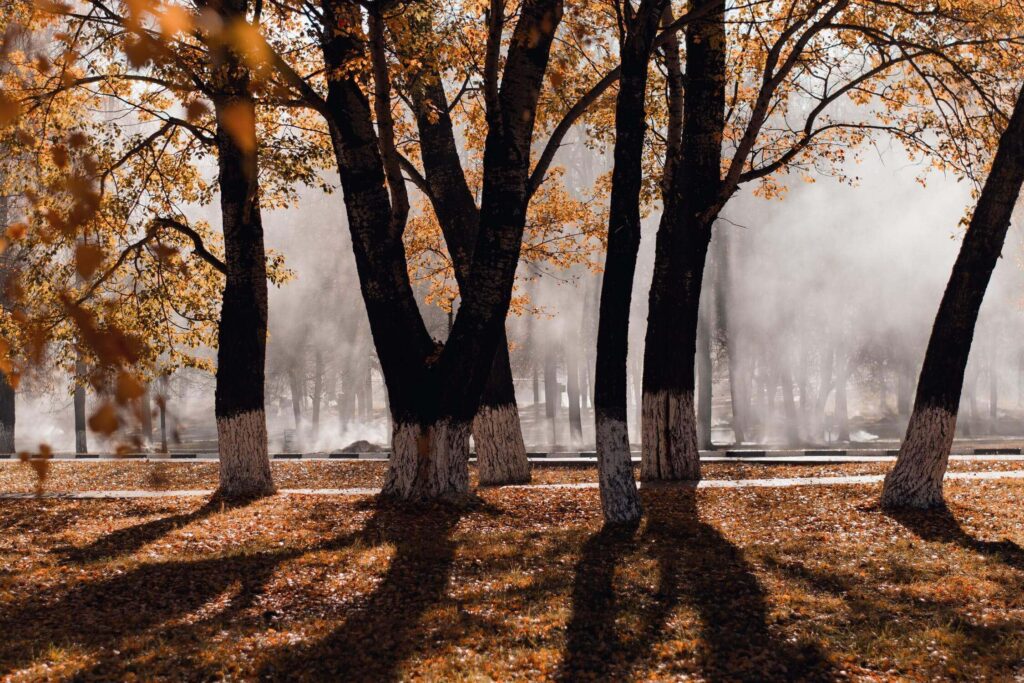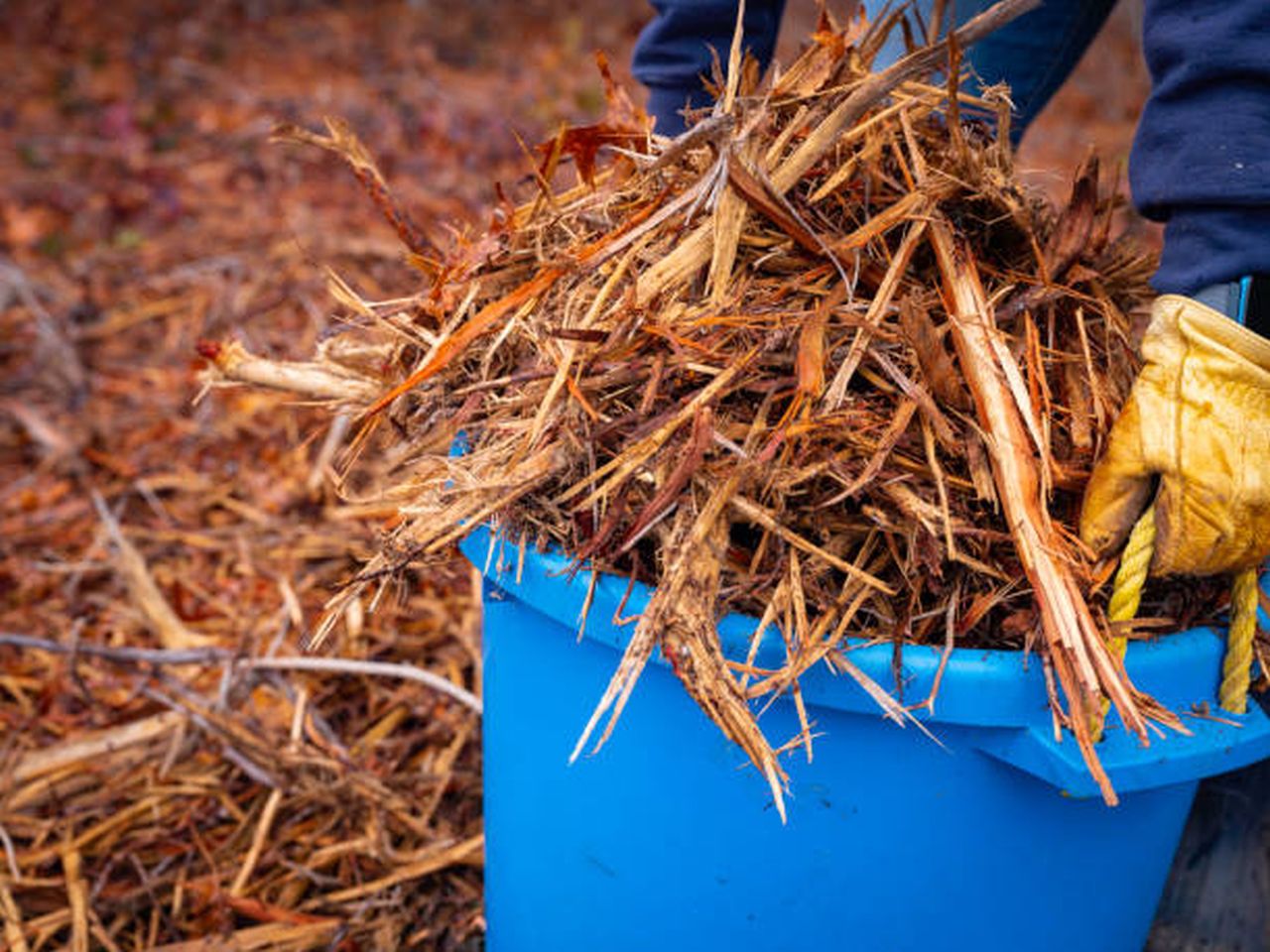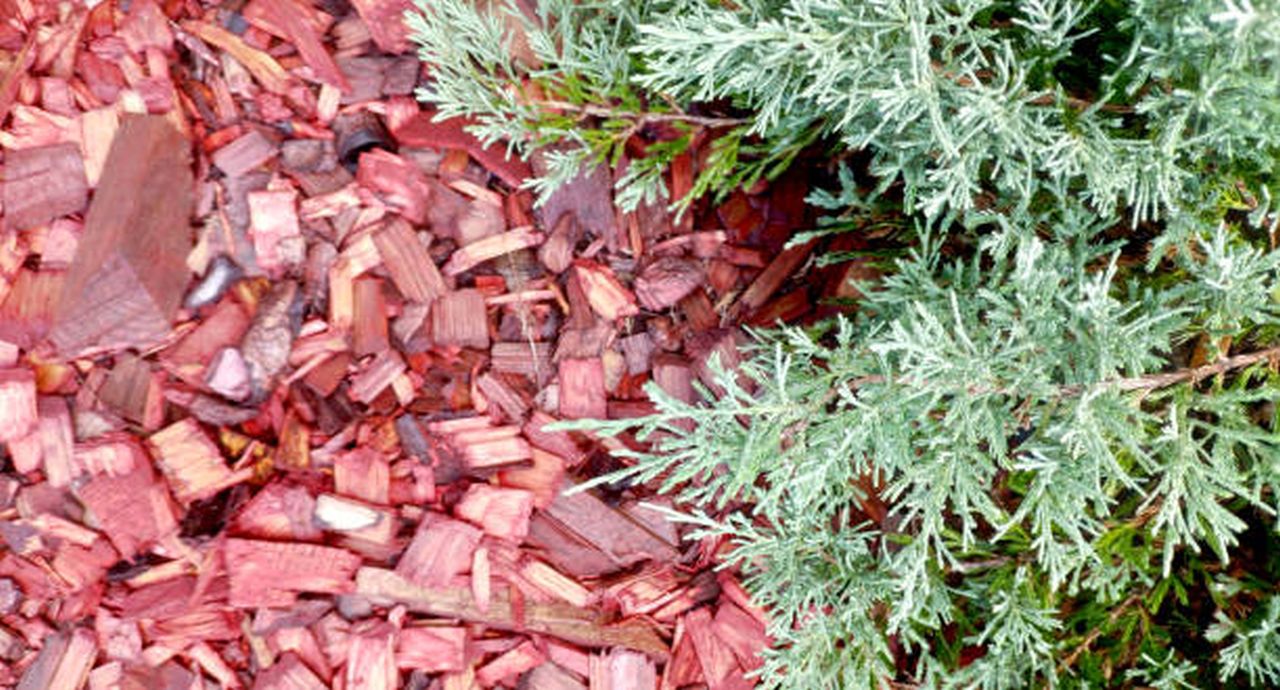While the application of new cedar mulch may cause a negligible amount of acid to seep into the soil, this is usually not a concern and goes unnoticed. Even so, cedar mulch is best avoided if your soil is already on the acidic side.
It's possible that cedar's propensity for acidifying soil originates from the fact that cedar trees like acidic soil. However, the University believes that after considerable testing, it is doubtful that cedar mulch will have a long-term effect on pH.
By keeping the soil cold and aerated, preserving moisture, and encouraging soil microbes and earthworms, cedar mulch benefits trees, shrubs, and perennials. For this reason, cedar mulch also isn't suggested for annual flower gardens and other beds that must be replanted every year.
What You Should Know About Cedar Mulch
What about your plants? Will the cedar that safeguards your clothing also do the same for them? Experiment with it in your garden and watch how it performs under pressure.
Mulch made of cedar trees, such as eastern red cedar (Thuja plicata), eastern red wood (Juniperus virginiana), or white cedar (Thuja occidentalis), can be purchased in chip or shredded form. It's said to be long-lasting, smell nice, and keep insects away from your garden.
Mulch is useful for a number of reasons, including the addition of nutrients and the retention of moisture, but it should be applied with care. Mulch should be kept at least six inches away from the trunk or stems of plants to prevent rotting and to deny shelter to pests like rats and slugs. If you want to find out more about cedar mulch, read on.
It Gives Your Beds A Long-Lasting Look While Requiring Little Care.
One source claims that cedar mulch decomposes more slowly than other types of mulch. This could be attributed in part to a molecule in western and white cedar called thujaplicin, which prevents the growth of germs and moulds. White cedar is also said to be resistant to artillery fungus, which can infect other types of mulch. Mulch made of cedar should last longer because it decomposes more slowly than other types.
You'll want to compare the cost of cedar mulch vs the time saved maintaining it because of its longer lifespan. It has been claimed that the soil beneath cedar mulch becomes more acidic. It's not highly acidic, but it could still cause problems if your soil's pH is already low.
It Enriches The Soil With Nutrients.
Compost, which is created when organic matter decomposes, increases the soil's concentration of macronutrients like nitrogen and phosphorus and micronutrients like sulphur, carbon, and magnesium. The soil is left lighter and fluffier, similar to that of raised beds where the ground has not been trampled. This barrier shields the soil from erosion and softens the crust that forms on bare ground.
On the other hand, nitrogen can be released from the soil as new wood chips decompose. Confined plants with shallow roots are likely to be damaged, as the problem is usually only at the soil's surface. Any soil that will be covered with fresh mulch should still be fertilised with nitrogen-rich fertiliser.
It Adds An Extra Layer Of Defence Against Insect Pests.
Cedar mulch can prevent or eliminate pests like cockroaches, termites, and ants, much like a cedar chest or cedar-lined closet does for linens and clothing. The thujone oil it contains is responsible for the effect. Unfortunately, thujone has the potential to discourage beneficial insects like lacewings & ladybugs from visiting your garden.
The Internet is rife with false claims that cedar mulch is hazardous to plants due to the presence of thujone. There is hardly any proof of allelopathic activity either in Thuja or Cedrus spp., says a State University extension horticulture. Though it doesn't produce any chemicals that kill plants, she warns that seedlings can be smothered by mulches of any kind because their roots are still developing.
It Gives Your Gardens And Landscaping Plants A Nice Perfume And A Neat Appearance.
In part because of its link with nostalgic hope chests, the aroma of cedar is often well-received. Aromatherapists also suggest that it helps relax and focus persons who inhale it. In the early stages of its use in a garden, however, this mulch may irritate the senses of persons with severe allergies. After about a month, the smell supposedly disappears.
Cedar mulch, like other ground cover, may keep weeds at bay and help your landscape's many plants look like they belong together. It also shields the plant's leaves from getting dirty and perhaps fungus-causing splashes of soil. Too much mulch will smother established plants as well as young seedlings, so keep it to a depth of no more than 3 inches.
It Aids In The Retention Of Moisture In The Soil Of Your Garden And Landscaping Beds.
Mulches, including cedar, help maintain the soil beneath them moist by blocking evaporation, which means you can water less frequently. The humus which mulch decomposes into benefits both sandy and clay soils by making them more water-retentive and better able to drain excess water.
However, you should verify on a regular basis that the soil is staying damp under the mulch. If mulches are left out in the sun and heat for an extended period of time, they may dry up and develop a waterproof covering on their surface, preventing rainwater from reaching the soil below. In places prone to wildfires, wood mulch is not a viable option because of its high flammability when dried.
It Raises The Temperature Of The Soil Throughout The Year.
In order to maintain a more constant soil temperature, cedar mulch is a great choice. Mulch, spread after the earth has frozen in winter, aids in maintaining the ground's frozen state during brief winter thaws, preventing plants from being tricked into sprouting too soon. This also protects perennials from the soil heaving that might kill them. The intense cold can't get through the blanket, so you can grow plants that are only barely hardy within your zone.
The ground cools more slowly in the fall and warms up more slowly in the spring when mulch is left just on the garden year-round. In spite of the fact that cedar helps mature perennials deal with stress, it shouldn't be used in places where rapid warming is needed to plant seeds in the spring. The mulch you plan to use to keep your plants' soil cool this summer should wait to be applied until the seedlings are well established.
Frequently Asked Questions About Tree
Higher prices for live trees, she said, are a result of long-term industry trends combined with short-term factors, including higher costs for fuel, trucking and labor and severe weather in some growing regions.
Arborists charge higher mainly because of the complexity, unpredictability, and risky nature of the tree service. Their overhead costs are also high owing to the high insurance premiums they have to pay.
5,600 workers Employment Size. Medium skill Skill level rating. 82% Full-Time Full-Time Share.
Inspect trees carefully and systematically. Examine all parts of the tree, including the roots, root or trunk flare, main stem and bark, the overall canopy, and individual branches. Be sure to examine all sides of the tree. Use a pair of binoculars to see branches high off the ground.
A level 5 arborist is an arborist who has attained the highest level of qualification and experience that is possibly attainable in the field. Their extensive training, unrivaled tree knowledge, and wealth of experience usually make them ideal consultants.
Uses, Benefits, And Drawbacks Of Cedar Mulch In The Garden
Mulching over the soil is a typical piece of advice given to gardeners in order to help keep the soil moist for longer; but what exactly does this entail, as well as which mulch is ideal? Wood chip mulch and wood shred mulch are the two most popular types of mulch, with cedarwood being such a popular choice.
What is it about cedar mulch that is so good for our plants? How and when should we use it, and perhaps more importantly, when shouldn't we use it? Let's delve in and learn all there is to know concerning cedar mulch and the numerous uses for gardeners.
Mulch is a layer of organic material spread over topsoil to improve plant health. Mulch can be formed from a variety of materials, including bark, wood chips, grass clippings, pine needles, and more.
Mulch formed from cedar trees is often made from shredded or chopped cedar wood. Cedars are popular evergreen trees that thrive in Defining zones 7 through 9.
How Do You Use Cedar Mulch In Your Garden?
Mulch made of cedar serves multiple purposes, both practical and attractive. It is typically put to use to prevent water from evaporating, to prevent the growth of weeds, to insulate the soil, to enhance the aesthetic appeal of beds, and to ward off Cedar mulch that is spread in the same fashion regardless of why you're using it.
Apply a layer of cedar mulch towards the soil's top layer, ideally 3 inches deep. Since cedar chippings are heavier, they are best used as a mulch around the trunks of large plants. Shredded cedar's finer texture and lighter weight make it an ideal material for use around more fragile plants like flowers and shrubs.
Leave a space around the exterior of the trunk when mulching around shrubs, stems, or tree trunks to prevent the mulch from touching the tree. Wet mulch placed against the stems or trunk could cause the plant to decay and prevent air circulation around the trunk, which can lead to the spread of disease.
Retention Of Water
Soil moisture retention can be improved with the use of cedar mulch. This is achieved because the barrier it creates between the soil and the air helps to reduce the rate at which moisture is lost to the atmosphere. It also benefits in limiting water loss due to evaporation by maintaining a consistent soil temperature.
Even light breezes can quickly deplete soil moisture, but a mulch layer can shield the soil from the wind and keep it more hydrated for longer. Soil that can hold onto water is useful for a number of reasons. When you mulch around your plants, the soil won't dry up as soon, so you won't have to water them as often.
As a result, your plants will be able to go longer without being watered, which is ideal if you tend to forget or will be away from home frequently.
Because the water that would have evaporated is now being put to good use, you will also be able to reduce the amount of water used for irrigation. There will be less water waste and a lower water cost for you as a result.
Weed Repression
Everyone who tends a garden shares a similar distaste for weeds. Inhibiting weed development using cedar mulch allows you to spend less time pulling weeds and more time appreciating your garden. Mulch serves as a multi-pronged defence against weeds, preventing them from germinating and eventually taking over. To begin, the mulch serves as a physical barrier, preventing weed seeds from reaching the soil's surface. Secondly, mulch blocks sunlight from accessing the soil by acting as a reflective barrier.
Most weed seeds can't germinate without light; thus, weeds won't grow if there isn't any. Although certain weeds may persist in spite of your best efforts, you'll have no trouble spotting them against the dark colour of cedar mulch.
Insulation Of The soil
By acting as a thermal barrier, cedar mulch keeps soil temperatures moderate year-round. Especially if you reside in a region with dramatic temperature swings throughout the year, this will help your plants thrive. Using cedar mulch as a ground cover will make the soil temperature more consistent all year for your plants.
Cedar mulch is helpful because it acts as a blanket over the soil, reducing the sun's intensity and hence the soil's temperature, which is something most plants dislike in the summer. Similarly, cedar mulch can aid in preventing the freezing of plant roots during the winter by insulating the soil, preventing snow or ice from making contact with soil, and retaining any residual heat that exists beneath the mulch.
Beautiful Beds
Cedar mulch has the added benefit of enhancing the visual appeal of flower beds and borders. Cedarwood's red or orange tone, which can vary, stands out nicely against the greenery of the plants it complements. Furthermore, many individuals prefer gardens with a more unified aesthetic. In addition to its aesthetic value, cedar mulch also brings a nice aroma to a garden.
Repellent For Bugs
Because of its inherent ability to deter insects, cedarwood is a great choice for bedroom furniture because it is not susceptible to infestation by dust mites, and it doesn't attract moths. If you're dealing with bug problems in the garden or just want to take preventative measures, spreading cedar mulch around your plants' bases can be a good idea.
Long-Lasting Mattresses
Since cedar mulch doesn't decompose quickly, you won't have to refill it for a while if you use it to topcoat your soil. If you use grass cuttings or straw as mulch, for example, it will decompose and must be renewed every year.
Cedar mulch is indeed a risk-free choice if you'd like to make a long-term investment in your garden. Cedar mulch has the added benefit of enriching the soil when it decomposes.
The Benefits And Drawbacks Of Cedar Mulch
Pros:
- controls the temperature of the soil.
- helps keep soil moisture from escaping.
- decreases the potential for weed growth.
- Effortlessly wards off pests.
- Reduces the risk of flooding.
- Has a nice aroma
- It's a pretty colour and design, overall.
- Prolonged use without frequent replacements
Cons:
- It's the priciest variety of wood mulch available.
- Some folks might find the odour unpleasant.
- Reduces soil nitrogen levels.
- It may prevent helpful insects from making your garden their home.
- It has the potential to acidify soil.
When To Avoid Using Cedar Mulch
Mulching with cedar chips is a good choice for most gardens, but it's not always the finest material to use. If any of these conditions seem familiar, maybe you should look for a different mulch or just skip mulching altogether.
Allergies To Fragrances
Cedar mulch is not a good choice if you or anybody in your social circle has a sensitivity to odours. It emits an aroma that is generally pleasant, while it may trigger an allergic reaction in those who are particularly sensitive to odours. As a result of recent publicity, many businesses have instituted fragrance-free zones.
Sneezing, watery eyes, a running nose, or skin irritations are just some of the possible reactions if you're allergic to cedar mulch.
Soil Acidic
Mulch made from cedar trees may alter the soil's acidity. Using fresh cedar mulch has the potential to introduce negligible levels of acid into the soil, however this is typically not a concern and goes unnoticed. However, cedar mulch should be avoided if the soil is already acidic because it can exacerbate the condition.
Nitrogen Deficiency
Decomposing cedar mulch is known to boost soil nitrogen levels. This is a natural occurrence for any woody plant and can lead to depleted nitrogen levels in the soil, making it difficult or impossible to provide adequate nutrition for the plant.
These effects are limited to the top layer of soil, or wherever the mulch is touching the ground. Cedar mulch shouldn't be an issue if it's not affecting the nitrogen levels at the plant's roots, as that's where the mulch is often applied. Except for when it's incorporated into the soil layers, where it might reduce nitrogen levels around roots and have a detrimental effect.
Use only cedar mulch over long-term vegetation to prevent this problem. If you plan on tilling the soil around your vegetable plants and incorporating the mulch into the soil, you should avoid using this product in that area. It's a good idea to apply some nitrogen-rich fertiliser to a soil just in case there's a problem with the ratio.
Beneficial Insects
Although the natural insecticide quality of cedar mulch is appealing, it also means that it will prevent beneficial insects from settling in your garden.
Natural pest management is just one of the many ways in which beneficial insects benefit your garden. They also serve as natural fertilisers by pollinating your plants so that you can enjoy more abundant blooms and harvests. Ladybugs, hoverflies, butterflies, moths, bees, & parasitic wasps are all examples of beneficial insects.
They consume or lay eggs in or on a variety of garden pests, including such aphids, effectively eradicating them.
Mulch made from materials other than cedar is preferable if you want to attract beneficial insects to your garden.
Conclusion
Cedar mulch is sold. It should last long, smell well, and keep pests out of your garden. Keep mulch six inches from tree and shrub bases. Organic matter breaks decomposition, releasing carbon dioxide and water into the air and increasing soil macronutrients like nitrogen and phosphorus. Cedar mulch may repel cockroaches, termites, and ants.
New seedlings and established plants should not be smothered by mulch. Mulch helps plants. Wood chips and shreds make up most mulch. Shredded or chopped cedar makes cedar mulch. Mulch can stop weeds with multiple defences.
It slows water evaporation by blocking soil-air contact. Cedar mulch helps plants by stabilising soil temperature. Cedarwood's crimson and orange hues contrast with its partners' luxuriant foliage. This is a long-term garden investment. Cedar chips are good mulch for most plants, but only sometimes.
Cedar mulch smells great, but persons with smell sensitivity may be allergic to it. Cedar mulch lowers soil nitrogen, making it difficult to feed plants. In addition, this mulch repels helpful insects.
Content Summary
- Even so, cedar mulch is best avoided if your soil is already acidic.
- However, the University believes that after considerable testing, it is doubtful that cedar mulch will have a long-term effect on pH. Cedar mulch benefits trees, shrubs, and perennials by keeping the soil cold and aerated, preserving moisture, and encouraging soil microbes and earthworms.
- Experiment with it in your garden and watch how it performs under pressure.
- If you want to find out more about cedar mulch, read on.
- This barrier shields the soil from erosion and softens the crust that forms on bare ground.
- Any soil covered with fresh mulch should still be fertilised with a nitrogen-rich fertiliser.
- Cedar mulch can prevent or eliminate pests like cockroaches, termites, and ants, much like a cedar chest or cedar-lined closet does for linens and clothing.
- The thujone oil it contains is responsible for the effect.
- Unfortunately, thujone can potentially discourage beneficial insects like lacewings & ladybugs from visiting your garden.
- The Internet is rife with false claims that cedar mulch is hazardous to plants due to the presence of thujone.
- In the early stages of its use in a garden, however, this mulch may irritate the senses of persons with severe allergies.
- Like another ground cover, cedar mulch may keep weeds at bay and help your landscape's many plants look like they belong together.
- However, it would be best to verify that the soil is damp under the mulch.
- To maintain a more constant soil temperature, cedar mulch is a great choice.
- The ground cools more slowly in the fall and warms up more slowly in the spring when mulch is left in the garden year-round.
- The mulch you plan to use to keep your plants' soil cool this summer should wait to be applied until the seedlings are well established.
- Apply a layer of cedar mulch towards the soil's top layer, ideally 3 inches deep.
- Since cedar chippings are heavier, they are best used as mulch around the trunks of large plants.
- Soil moisture retention can be improved with the use of cedar mulch.
- When you mulch around your plants, the soil won't dry up as soon, so you won't have to water them as often.
- Inhibiting weed development using cedar mulch allows you to spend less time pulling weeds and more time appreciating your garden.
- First, mulch is a physical barrier, preventing weed seeds from reaching the soil's surface.
- As a thermal barrier, cedar mulch keeps soil temperatures moderate year-round.
- Using cedar mulch as a ground cover will make the soil temperature more consistent all year for your plants.
- In addition to its aesthetic value, cedar mulch also brings a nice aroma to a garden.
- If you're dealing with bug problems in the garden or want preventative measures, spreading cedar mulch around your plants' bases can be a good idea.
- Mulching with cedar chips is a good choice for most gardens, but there are better materials.
- Cedar mulch is not a good choice if you or anybody in your social circle is sensitive to odours.
- Sneezing, watery eyes, a running nose, or skin irritations are possible reactions if you're allergic to cedar mulch.
- Mulch made from cedar trees may alter the soil's acidity.
- Using fresh cedar mulch has the potential to introduce negligible levels of acid into the soil. However, this is typically not a concern and goes unnoticed.
- However, cedar mulch should be avoided if the soil is already acidic because it can exacerbate the condition.
- Decomposing cedar mulch is known to boost soil nitrogen levels.
- Cedar mulch should be fine if it's not affecting the nitrogen levels at the plant's roots, as that's where the mulch is often applied.
- Use only cedar mulch over long-term vegetation to prevent this problem.
- Although the natural insecticide quality of cedar mulch is appealing, it also means that it will prevent beneficial insects from settling in your garden.
- Natural pest management is just one of the many ways in which beneficial insects benefit your garden.
- Mulch made from materials other than cedar is preferable if you want to attract beneficial insects to your garden.




